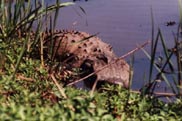Savannah Harbor
[Posted Dec 2] Last year South Carolina's Supreme Court
threw out Jasper County's challenge to condemn 1,776 acres of
Georgia- owned land in South Carolina, deciding that it would
violate the spirit of South Carolina's law to let South Carolina
take a private landowner's land and give it to SSA, another
private entity. The land currently is used by Georgia's
Department of Transportation to dispose of dredge spoils from
the maintenance of the Savannah River navigation channel.
This is where you have to give the devil his due. Jasper
County fired their lead legal counsel on the failed bid for
condemnation and replaced it with a Columbia law firm acclaimed
as "experts in condemnation law." Jasper County fired their
county administrator who was quickly hired by SSA as a port
consultant. And, most ambitiously, Jasper County formed their
own 7-member port authority to help masquerade as a
public/private partnership, hoping to circumvent the state's
condemnation law and obtain a favorable court ruling.
But, regardless of what you call it, the proposed Jasper
port would still primarily benefit Seattle-based SSA which
could offer sweatheart deals to its many world-wide customers
and pull unnecessary shipping traffic through the Savannah River.
Negative environmental impacts would be wetlands loss because of
the need to replace the dredge spoil acreage, water pollution
from the ships and the landside operations, and air pollution
from the dirty bunker fuel the containerships burn. Also
included would be almost all of the many dozens of impacts
already identified for the Savannah River harbor deepening
project.
Attracting unnecessary ship traffic to the Savannah River
would pose a very serious danger to the already highly
endangered Atlantic right whale since collisions with ships
is a well known cause of death to right whales. Mandatory
Ship Reporting (MSR) is considered the current chief measure
for reducing the right whale ship strike threat. MSR requires
that large ships report to shore when they enter critical
right whale habitat. But, off the coast of Georgia and Florida,
compliance has been poor, with only 50% compliance in 2003 and
a 63% average from January through April.
It might be tempting to look leniently on the proposed
Jasper port because the site is closer to the Atlantic Ocean
and Utopian-like speculation might induce one to believe that
a Jasper port would prevent the proposed harbor deepening
project for which an Environmental Impact Statement is
currently being prepared. That could be true. But, the best
way to find out is through the EIS process which must consider
alternatives to the proposed deepening project, including the
Jasper site. Any support for a proposed Jasper port at this
time could easily leave the environment with the devil....and
his due. [Author: Judy Jennings, Coastal Group, Sierra Club]
Savannah River Deepening
[Posted Dec 2] In August of this year, EPA published
its Draft Total Maximum Daily Load (TMDL) for Dissolved Oxygen
(DO) in Savannah Harbor which spans from Fort Pulaski (River
Mile 0) to the Seaboard Coastline Railway Bridge (River Mile
27.4). The watershed is defined as extending from Thurmond
Dam near Augusta to the Savannah Harbor.
A TMDL establishes the maximum amount of a pollutant a
waterbody can assimilate without exceeding the applicable
water quality standard, which in the Savannah Harbor is
coastal fishing aquatic life use.
EPA established this TMDL to satisfy a consent decree
obligation established between the Sierra Club and EPA. In
the Draft's Executive Summary, EPA states that it "would not
have chosen to propose this TMDL at this time due to concerns
surrounding the existing site-specific DO criterion for the
Harbor."
The Summary further states that to attain the recommended
criterion would require an approximate 30% reduction in the
total load of oxygen demanding substances currently being
directly discharged to the harbor or to the upstream watershed
from Thurmond Dam downstream.
Even though EPA did propose recommended DO criterion that
seems less protective than the state of Georgia's standards,
the prospect of a 30% reduction in discharges spun river
polluters into a finger-pointing, blame-avoiding frenzy.
Dischargers have stated that the real problem in the river
is the dredging to maintain harbor depth. River users point
out that the channel depth is a federal project which benefits
all of Georgia. And, believe it or not, they are all talking
about systems that would blow bubbles in the Savannah River to
supplement the dissolved oxygen which their activities deplete
and which aquatic life must have to survive.
These paragraphs summarize the 57 page EPA document.
[Author: Judy Jennings, Coastal Group Sierra Club]
[Posted Nov 1] The deepening of the Savannah River
from 42' to 48' for the ship channel to the Georgia Ports
Authority, west of Savannah, is presently on hold, following
$4,000,000 worth of state and federal environmental impact
studies, scientific monitoring, and one model, all of which
produced more questions than answers. Our primary concern is
the impact on the Floridan Aquifer and the Savannah National
Wildlife Refuge. The model received strenuous negative
objections from all of the natural resources agencies.
Work will proceed utilizing one or more additional models.
Mulberry Grove Plantation
[Posted Dec 2] There are times in environmental
advocacy when a change in direction is necessary. Such is
the case with Coastal Group's efforts to promote a full-scale
landswap to protect the environmentally sensitive and culturally
significant lands of Mulberry Grove Plantation and neighboring
historic plantation properties. Due to competing demands and
limited funds, a dollar-for-dollar landswap between US Fish and
Wildlife Service and Mulberry Grove's owner Georgia Ports
Authority no longer seems possible. Some development on the
properties, including some in private hands other than GPA,
now seems inevitable. However, Coastal Group remains a committed
partner with other environmental and historic preservation
organizations to preserve as much land as possible. Also, we
will work in every way possible to ensure that all development
is environmentally sensitive using appropriate site planning
and state of the art technology to eliminate or contain sources
of non-point source pollution, reduce air pollution, preserve
habitat value in developed areas, and preserve and enhance
cultural sites and artifacts.
[Posted Nov 1] The Mulberry Plantation land swap
proposal between the Georgia Ports Authority and Fish and
Wildlife Service continues toward an acceptable agreement
between both parties. The objectives of environmental and
preservation organizations are maintaining the present natural
wetlands and forest as an intact ecosystem, as well as the
heritage of the land.
Bi-State Mobility Authority
[Posted Nov 1] A very persistent group of elected
officials from Chatham and Effingham Counties in Georgia and
Beaufort and Jasper Counties in South Carolina is currently
attempting to push through the instant creation of brand-new
taxing government body called the Bi-State Mobility Authority.
As proposed, this mobility authority could acquire broad powers
over land, air, rail, and public transportation facilities in
the four county, two state region divided by the Savannah River.
The proposed authority would have power of eminent domain and
many other government related controls. Unless and until the
group engages the public in true regional transportation
planning and in the identification and approval of projects
that serve valid public needs, environmentalists will oppose
the creation of such a powerful new Authority.





